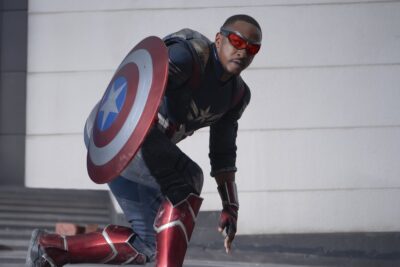Movie Review: Marvel treads water with ‘Captain America: Brave New World’
By Canadian Press on February 12, 2025.

Celebrate Valentine’s Day this year with “Captain America: Brave New World,” a highly processed, empty calorie, regret-later candy of a movie.
We’re nearing the end of Phase Five of the Marvel Cinematic Universe, with predictable and underwhelming returns. “Captain America: Brave New World” feels like it’s just treading water, wasting Anthony Mackie in his first cinematic outing as his “Hamlet”-like Captain America.
The story by Rob Edwards, Malcolm Spellman and Dalan Musson gathers familiar Marvel characters and blends them into a White House conspiracy-meets-international violent face-off in the Indian Ocean. Only Marvel in Phase Five could make that boring.
It lifts from “The Manchurian Candidate” and “Top Gun” and even pointlessly steals its title from Aldous Huxley. It cannibalizes from other Marvel movies, like the addition of a substance called Adamantium, much like Vibranium from Wakanda. There is a Kendrick Lamar song heard at the climactic end, but it’s not new; it’s from 2014.
We start with Harrison Ford as Thaddeus “Thunderbolt” Ross — taking the role over from from the late William Hurt — in his first days as U.S. president. He insists he’s changed from the days when he hunted down Hulk and was an all-around evil dude.
He approaches Sam Wilson, the new Captain America, and proposes a strategic union between the government and Captain America. “Work with me, Sam. We’ll show the world a better way forward.”
This is a dangerous idea — superheroes working for the government — and Cap is warned but still agrees. “Trust me. My eyes are wide open,” he reassures Danny Ramirez as his sidekick and fledgling new Falcon. (Cap’s eyes may be open but yours may be slowly closing).
There is a trio of bad guys, each more powerful and overacting as the last — a delicious Giancarlo Esposito as the villain Sidewinder, Tim Blake Nelson as Samuel Sterns (a hyper-intelligent megalomaniac with his brain literally bursting out of his skull) and Red Hulk, a massive slab of angry man-meat who makes the regular Hulk look like Timothée Chalamet.
There are also some tangential characters, like Isaiah Bradley, a Korean War veteran who was a Super Soldier but spent years in prison, and the weirdly cast Shira Haas as Ruth Bat-Seraph, a slippery national security agent with a murky agenda.
Director Julius Onah does well with the action but fumbles the quieter moments and supervises editing that’s the opposite of crisp, not helped by script writers who ape military language — “Negative, the package is the priority” — and grandiose sentiment — “The country is lost.”
For extra credit, spot all the product placements in the movie: Cap drives a GMC truck and uses Dell computers. The president of the United States uses a Peloton. What a wasted opportunity for Cap’n Crunch.
There does emerge a theme that unites Cap and Ross, which is that both feel the need to prove themselves. Mackie’s Captain America throughout the previous 2021 TV series “The Falcon and the Winter Soldier” was ambivalent about taking on the mantle of Steve Rogers, the original Sentinel of Liberty. “You wonder if you’ll ever be enough,” he says.
Ross says he wants to secure peace across the world but really wants to reconnect with his estranged daughter — Liv Tyler — and prove he’s changed. He wants to take a walk with her to see the cherry blossoms. We would like him to ask serious questions of his agent.
Mackie, who joined the MCU more than a decade ago in 2014’s “Captain America: The Winter Soldier,” has been a good servant to Marvel and deserves better. One of our great actors, he can be steely and vulnerable. But he can’t outrace stilted lines like “If we can’t see the good in each other, we’ve already lost the fight.” Marvel has lost more than the fight; they’ve lost the thread.
“Captain America: Brave New World,” a Walt Disney Pictures release that opens in theaters on Friday, is rated PG-13 for “intense sequences of violence, action and some strong language.” Running time: 118 minutes. One star out of four.
Mark Kennedy, The Associated Press
-18


